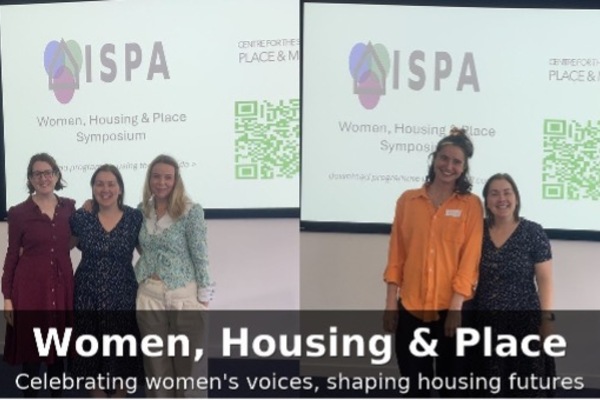In late March this year I had the opportunity to present findings from my PhD research HSA annual conference, in Sheffield. This was very meaningful to me as the HSA community have supported me throughout my PhD journey and I was excited to share these results with them. This blog post discusses the work I presented at the conference.
My research explored barriers and enablers to the growth of the community-led housing sector in England. Community-led housing is an overarching term for a sector formed of multiple housing practices with a shared focus on empowering communities and delivering housing that is owned or stewarded by residents and the local community. The most prominent practice types which fall under the umbrella are Community Land Trusts (CLTs), Co-housing models, Co-operatives, and forms of self-build. Combinations of these models and new models have also formed in response to local housing need. The idea behind community-led housing practices is to overcome the profit incentives which drive the mainstream housing market, avoid development that is seen as ‘out-of-touch’ by housing associations or the state, and develop innovative and alternative housing. This is housing development which prioritises affordability, local connection and the social or environmental aims of the group.
Over the past decade these forms of housing development have seen increased interest from citizens and campaigners as well as academics. There has also been intermittent support from politicians at the national and local level. Notably, this political support led to the development of the Community Housing Fund which represented a significant investment in the sector. Stakeholders hoped that increased attention, and access to the dedicated funding of the Community Housing fund, would manifest in a growing pipeline of completed projects. The ambition of this growth was to take the sector from the fringes of the development game to a mature sector with a demonstrable track record of the delivery of housing units, and, more importantly, good quality affordable homes.
However, the route to achieving a community-led vision is notoriously long and complex. It involves significant effort from the community group and entails knowledge and understanding of the development process not normally found in a group of ordinary people. Therefore, whilst funding opportunities were important, stakeholders were also keen that access to advice, support and guidance on community-led housing be improved. For this reason, a key development in the sector over the past few years was the funding of ‘enabling hubs’, regionally based infrastructure organisations to support community-led housing. This idea received significant investment from both national government and large charitable funders. Now, in 2023, these funding programmes have ended. My research explored the role of the enabling hub in the growth of a community-led housing sector and considers questions about the role of support infrastructure in the growth of a grassroots movement.
Within the research, enabling hub support, and the related professionalisation of the community-led housing adviser role was seen by stakeholders as vital for sector development. One participant described the enabling hub network as “one of the major missing pieces in the jigsaw of getting this sector up and running properly”. This related to a firm belief among national stakeholders that unequal access to advice and guidance for community-led housing groups would limit the growth of the sector. Furthermore, policy makers and stakeholders at the national level wanted to ensure that the advice and support was of consistent quality across the country. Therefore, work was undertaken to professionalise the role of community-led housing adviser, including through the creation of an accredited training course. Enabling hubs were host organisations for these community-led housing professionals and provided an entry point for anyone interested in community-led housing in the local area.
The research showed that enabling hubs were able to support community-led housing groups in progressing their projects, providing critical support to local volunteers. They also undertook active work with under-represented and diverse communities to broaden the scope of community-led housing. A further important role for the enabling hub was undertaking policy and influencing work to support understanding and championing of community-led housing approaches within local policy landscapes.
However, there were significant practical issues with the establishment of the enabling hub programme. The national government funding for enabling hubs was short-term, originally announced as two years it was condensed to 18 months. This was a particular challenge as the enabling hub programme was predicated on the idea that enabling hubs could become financially self-sustaining entities and not receive further grant funding after the initial period. Many stakeholders believed this could be achieved through drawing a fee from completed community housing projects which could be added to the cost of development. However, this model was not achievable in many cases, especially within the short-time frame offered by the initial funding. Furthermore, much of this period of operation coincided with the Covid-19 pandemic lock-down restrictions.
For this reason, the enabling hubs in my research study were all in the process of undergoing changes to align themselves to a more financially sustainable positioning. This process also entailed developing different identities, in some cases focusing on particular models or opening up further routes of income such as becoming a registered provider of social housing and beginning to be an asset holding organisation, similar to a small housing association.
The introduction of funding and formalisation of the role of the enabling hub also introduced contestation to the community-led housing space. For example, a participant noted that there was a “risk when you bring money, bring in professionals, and competition” that what emerged “isn't really bottom-up community development.” This demonstrates the unease among some members of the community-led housing sector in promoting sector growth in a way which professionalised and standardised the process of engaging with community-led housing activity. Furthermore, participants raised the question of whether the intervention of enabling hubs would encourage community-led housing groups to engage in development types that are more likely to lead to a completion of the development (for example, by partnering with a housing association or taking on some homes from a larger development), even if those options were not in line with the group’s vision. If the sector is to grow, actors in the community-led housing sector will be required to continue to manage the contradictions of working for change within a mainstream system from a place of alternatives.
These complications are examples of the pressure that innovative ideas can face as proponents try to establish them. There can be tension between the most successful routes to delivery, which typically align themselves with more mainstream ways of acting and more powerful actors, and the core values of the alternative model of development. They also highlight the delicate role of intermediary organisations such as enabling hubs in supporting citizen initiatives through engagement with the mainstream sector.
As the pernicious impacts of an unjust housing system and the imperative to engage in environmentally sustainable development and retrofit only increase with time, the role of housing alternatives only grows in importance. Therefore, the contribution of the community-led housing sector remains important. Hopefully, as the sector grows it will provide the power to foster innovation to the wider housing system and make a contribution beyond individual units. For this, the sector needs to continue to demonstrate real alternatives through successful development. To do this successfully, some form of advice and guidance is clearly necessary, but what form this will take long-term is now unclear.

Author
Philippa Hughes has recently completed a PhD at the University of Sheffield researching community-led housing. She is currently a research associate at the University of the West of England exploring biodiversity on new urban development. In the year 23/24 she will be a postdoctoral fellow at the University of Liverpool continuing her research into community-led housing and its links to sustainability in housing.






